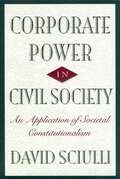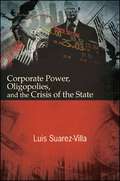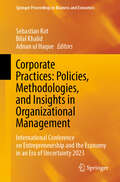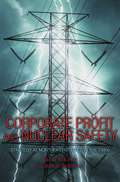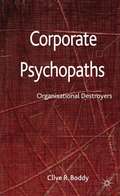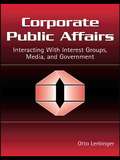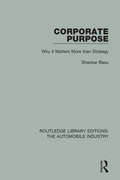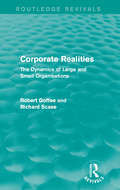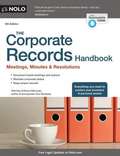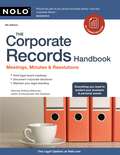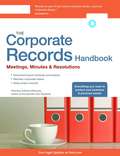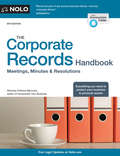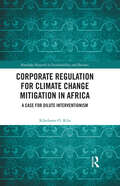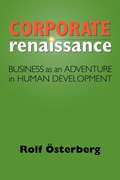- Table View
- List View
Corporate Power in Civil Society
by David SciulliThe corporate mega-mergers of the 1980s and 1990s raise many troubling questions for social scientists and legal scholars. Do corporate globalism and the new, streamlined corporation help or hinder the development of civil society? Does the new power that increasingly deregulated businesses wield undermine the rights of citizens, or is this threat being exaggerated? Who has the authority to get things done in a corporation's name and who can be held legally responsible for a corporation's misbehavior? What role, if any, should the courts play in strengthening the rights of individuals who challenge the actions of big business? David Sciulli maps the legal limits of corporate power in our democratic society, and explores the role of the corporate judiciary in creating public policy. He argues that the judiciary must be more vigilant and act to curb corporate abuses. He demonstrates that when corporations exercise their private power in civil society, they are just as capable as the state of exercising it in ways that are dangerous, arbitrary, and challenge the basic institutional arrangements of society. Finally, Sciulli calls for sociologists to involve themselves more deeply in issues of corporate governance and commit their discipline to influencing the decisions of the courts.
Corporate Power, Oligopolies, and the Crisis of the State
by Luis Suarez-VillaThe largest, wealthiest corporations have gained unprecedented power and influence in contemporary life. From cradle to grave the decisions made by these entities have an enormous impact on how we live and work, what we eat, our physical and psychological health, what we know or believe, whom we elect, and how we deal with one another and with the natural world around us. At the same time, government seems ever more subservient to the power of these oligopolies, providing numerous forms of corporate welfare—tax breaks, subsidies, guarantees, and bailouts—while neglecting the most basic needs of the population. In Corporate Power, Oligopolies, and the Crisis of the State, Luis Suarez-Villa employs a multidisciplinary perspective to provide unprecedented documentation of a growing crisis of governance, marked by a massive transfer of risk from the private sector to the state, skyrocketing debt, great inequality and economic insecurity, along with an alignment of the interests of politicians and a new, minuscule but immensely wealthy and influential corporate elite. Thanks to this dysfunctional environment, Suarez-Villa argues, stagnation and a vanishing public trust have become the hallmarks of our time.
Corporate Practices: International Conference on Entrepreneurship and the Economy in an Era of Uncertainty 2023 (Springer Proceedings in Business and Economics)
by Adnan Ul Haque Sebastian Kot Bilal KhalidWe are delighted to present this compilation of insightful contributions from the Global Conference on Entrepreneurship and Economy in an Era of Uncertainty (EEEU23) hosted by the International Research Center for Higher Education and Business Cooperation in Poland. This book explores the ever-changing field of entrepreneurship in the digital economy, emphasizing the pivotal role of innovation in navigating through today's global disruptions, such as pandemics and regional instabilities that reverberate through economies.In a time where rapid innovation is the linchpin for sustained relevance, companies face the critical imperative of adapting swiftly to the changing tides. This collection sheds light on the reality that organizations, even those with a long-standing market presence and solid managerial frameworks, can only avoid obsolescence if they innovate at the pace demanded by contemporary circumstances. The cautionary tales of once-thriving entities like Eastman Kodak Company, Polaroid Corporation, Xerox, and others serve as poignant reminders of the imperative of agile innovation in today's business environment.The chapters presented within this book offer a thorough exploration of the profound influence of digital innovation on entrepreneurship, coupled with an examination of the pivotal role of strategic organizational management in the sustenance and prosperity of enterprises. As such, this book is an invaluable resource for researchers and professionals seeking to deepen their understanding of the application of innovation and disruptions in entrepreneurship and organizational management.The insights and disclosures encapsulated within these pages will catalyze meaningful dialogue and inspire innovative approaches to pursuing entrepreneurial success amidst a landscape characterized by uncertainty.
Corporate Profit and Nuclear Safety: Strategy at Northeast Utilities in the 1990s
by Paul W. MacAvoy Jean W. RosenthalNortheast Utilities Company adopted an ambitious new competitive strategy in the mid-1980s, seeking to become the low-cost supplier in New England electric power markets bracing for deregulation. Given its high-cost nuclear facilities, doing so required a corporate turnaround. For a decade Northeast faced increasing public and employee resistance to cost cutting at its nuclear plants. Though management achieved many of its goals, curtailing outlays on nuclear operations meant high risk that the Nuclear Regulatory Commission would close the plants because of frequent, prolonged outages. This is just what happened in 1996. Did management's deliberate cost-containment strategy take nuclear operations to an inevitable regulatory shutdown, and if so, why? Was it the pursuit of executive compensation tied to cost containment that caused undue risk of regulatory shutdown? Paul MacAvoy and Jean Rosenthal describe ten years of corporate performance preceding the shutdown, detailing aggressive executive decisions, mounting regulatory actions in response to increasingly severe operational failures, and--at the same time--overall improvement in corporate earnings, stock prices, and executive pay packages. They relate the complexities of managing declining nuclear plant operations under ever more pressing budgetary targets. Their discussion of the increasing risk of outages raises the issue of the tradeoff of profit and conservative management of hazard operations. All the more timely in light of the massive 2003 East Coast blackout, Corporate Profit and Nuclear Safety represents a powerful and cautionary commentary on industrial practices that goes to the heart of effective corporate governance.
Corporate Psychopaths
by Clive R. BoddyPsychopaths are little understood outside of the criminal image. However, as the recent global financial crisis highlighted, the behavior of a small group of managers can potentially bring down the entire western system of business. This book investigates who they are, why they do what they do and what the consequences of their presence are.
Corporate Psychopathy: Studienergebnisse, Herausforderungen und die Rolle der Internen Kommunikation im Umgang mit der Dunklen Triade in Unternehmen
by Annett Bergk Romy Frandrup Christopher MoraschIn diesem Buch gehen Kommunikationsexpert*innen aus Theorie und Praxis der Frage nach, wie „psychopathisch“ es in den heutigen Führungsebenen zugeht. Seit mehr als 20 Jahren ist der Begriff der „Dunklen Triade“ aus psychologischer und medizinischer Forschung bekannt und begegnet uns seitdem regelmäßig in den Medien, die über die Verbreitung dieses Dreiklangs aus Narzissmus, Machiavellismus und Psychopathie in den Führungsetagen und Vorstandszimmern der Welt berichten. Dieses Fachbuch richtet sich an Menschen, die in Teams arbeiten, selbst als Führungskräfte im Einsatz sind oder sich mit der Optimierung von Teamwork beschäftigen. Es soll aufzeigen, wie Personen mit psychopathischen, machiavellistischen oder narzisstischen Tendenzen in Unternehmen agieren, welche Effekte sie auf das Team haben und wie verschiedene Situationen kommunikativ verbessert werden können.. Es wird ein Forschungsüberblick zu narzisstischen, machiavellistischen und psychopathischen Führungskräften in der Arbeitswelt gegeben und vorgestellt, wie Corporate Psychopaths in den Medien dargestellt werden. Ein Beitrag geht der Frage nach, warum Führungskräfte manchmal vielleicht auch narzisstisch wirken müssen. In einem umfangreichen Beitrag werden die Unterschiede psychopathischer Persönlichkeitszüge zwischen Manager*innen und Menschen ohne Führungsverantwortung analysiert und dargelegt, was es bei der Besetzung von Managementpositionen zu berücksichtigen gilt. Mehrere Beiträge beschäftigten sich mit der besonderen Rolle der Internen Kommunikation: Wie kann die Interne Kommunikation schwierige Unternehmenspersönlichkeiten erkennen und welches Wissen braucht sie für einen erfolgreichen Umfang mit diesen? Es wird gezeigt, wie es gelingen kann, die negativen Effekte von Corporate Psychopathy einzudämmen und die Chancen der Personalauswahl bei der Identifikation von Corporate Psychopaths werden eingeordnet.
Corporate Public Affairs: Interacting with Interest Groups, Media, and Government
by Otto LerbingerCorporate Public Affairs explores the increasing interest in public affairs by today's organizations. Lerbinger indicates that more and more frequently corporations are establishing public affairs positions--typically within public relations departments--to respond to issues and concerns arising out of the sociopolitical environment in which the corporation functions. He articulates the functions and responsibilities of the public affairs role, and investigates the approaches to dealing with primary constituencies--interest groups, media, and government.Divided into five parts, this book:*provides an overview of the corporate public affairs function;*explores strategies of the myriad interest groups in the United States, such as labor unions and environmental, consumer, women's, and human rights groups;*recognizes the media's increasing coverage of business events, especially negative ones, that have tremendous power both to undermine corporate credibility and to support public policy positions;* deals with legislative, executive, and judicial branches of government; and*raises the question of how corporate power strategies have affected the political marketplace.This book will appeal to advanced-level students, scholars, and practitioners in public relations and business fields.
Corporate Punishment
by James AdonisThink there's no 'I' in team'? There is. Believe that together everyone achieves more? They don't. Asked to give it 110 per cent? You can't. Think employees are your greatest asset? They ain't. Got an open-door policy? For goodness sake -- shut it!Whether you're a perpetrator or a casualty of cringe-worthy corporate clichés (or both), Corporate Punishment will challenge the way you think about the world of business and the mind-numbing management mottos that have underpinned it for decades. From teams and leadership to workplace culture and customer service, James Adonis smashes to pieces some of the most deeply entrenched business philosophies, offering in their place a progressive new thought process that's light on rhetoric and boring theory, but heavy on practicality and imagination.This book is a protest, a movement, a changing of the management guard -- it is the breath of fresh air every modern business needs and a long overdue break from the hot air that most are forced to endure.
Corporate Purpose and Responsibility
by Lynn Sharp PainePresents several conceptions of corporate purpose and responsibility as articulated by a variety of groups and individuals during the period 1970-95. Included are materials from the Business Roundtable, the American Law Institute, the Royal Society of Arts and Manufacturers (U.K.), the U.S. Catholic Bishops, and excerpts from the writings of economist Milton Friedman and lawyer Christopher Stone. A brief introduction provides historical background on the corporate responsibility debate.
Corporate Purpose – das Erfolgskonzept der Zukunft: Wie sich mit Haltung Gemeinwohl und Profitabilität verbinden lassen
by Annette Bruce Christoph JerominIn diesem Buch erläutern die Autoren, was Corporate Purpose ist und warum er ein Unternehmen von Grund auf verändern wird. Unternehmensentscheider erfahren, wie Corporate Purpose sein Nutzenpotential gleichzeitig im Unternehmen und im Gemeinwohl entfalten kann. Sie erhalten einen Leitfaden und jede Menge Praxiswissen, um auf der Grundlage von Purpose ein tragfähiges Geschäftsmodell mit starken Marken und einem überzeugenden Beitrag zum Gemeinwohl entwickeln und implementieren zu können.Nachwachsende Generationen machen zurzeit überdeutlich: Reine Profitorientierung reicht für die Wettbewerbsfähigkeit eines Unternehmens immer weniger aus. Heute wird von Unternehmen und Marken erwartet, dass sie gesellschaftliche, ökologische und soziale Belange in ihrem Handeln fest verankern und auch für diese Verantwortung übernehmen. Die Mühe lohnt, denn erste Studien zeigen: Unternehmen mit einem klar definierten Purpose wachsen überdurchschnittlich.Aus dem Inhalt Das ist Corporate Purpose und so kann er entwickelt und verankert werden Das kann Corporate Purpose für Unternehmen und Gemeinwohl leistenDrei Handlungsszenarien für die Arbeit mit Corporate Purpose in der PraxisCheckliste zur Einschätzung des Potentials von Corporate Purpose in Ihrem Unternehmen16 Fallbeispiele aus der Praxis vom Start-up über KMU bis zum Global Player So können Sie den Erfolgsbeitrag von Corporate Purpose messenVerantwortungseigentum: eine rechtliche Struktur für purpose-orientierte UnternehmenInterviews zu Praxis-Cases mit: Susanne Franz (Audi), Ulrike Haugen (DNV GL Group), Varena Junge (enyway), Gabriella Ekelund (Essity), Jean-Gabriel Duveau (Gillette), Jan Fischer (Hamburg Towers), Dr. Jens Ade (Hinz&Kunzt), Udo Schulte (Lemonaid), Louise Brierley-Ingham (Patagonia), Markus Essing (Philip Morris International), Karen Löhnert (sleeperoo), Nina Witt (Stop the water while using me), Dr. Antje von Dewitz (VAUDE), Carolin Stüdemann (Viva con Agua) sowie Nataliya Yarmolenko (Weleda) sowie mit dem Team von Mercedes-Benz Cars.Mit einem Gastbeitrag von Achim Hensen (Purpose Stiftung).
Corporate Purpose: Why It Matters More Than Strategy (Routledge Library Editions: The Automobile Industry)
by Shankar BasuOriginally published in 1999 after a decade of research and extensive interviews with some of Toyota's top executives, this book examines organizational purpose: what it is, how it is crafted, how does it relate to strategy and objectives and how does it relate to decisions and actions that ultimately produce organizational results. The author explains why Toyoto Motor Corporation was selected to study corporate purpose and examines the various factors that influence purpose. An overview is given of Toyota in the 1990s and its operating environment, particularly outlining the importance of the Japanes motor industry to Japanese society. Operational objectives of Toyota are analyzed and research findings, data and analysis related to Toyota's purpose are presented and the implications described. In the appendix, the detail of the research methodology of this study is included.
Corporate Real Estate Asset Management: Strategy and Implementation
by Nick Nunnington Barry Haynes Timothy EcclesThe second edition of Corporate Real Estate Asset Management is fully up to date with the latest thought and practice on successful and efficient use of corporate office space. Written from an occupier’s perspective, the book presents a ten-point CREAM model that offers advice on issues such as sustainability, workplace productivity, real estate performance measurement, change management and customer focus. In addition, new case studies provide real-life examples of how corporations in the UK, USA, Hong Kong and Abu Dhabi actively manage their corporate real estate. The book is aimed at advanced undergraduate and graduate students on corporate real estate, facilities management and real estate courses and international MBA programmes.
Corporate Real Estate Asset Management: Strategy and Implementation
by Nick Nunnington Barry P. HaynesIt is important for those studying and practicing in real estate and property management to learn to manage property assets effectively, to be able to provide their companies with effective property and facilities solutions. This book raises the awareness of how real estate management can support business, transform the workplace and impact upon people and productivity, ensuring that costs are minimized and profit maximized. Written for advanced undergraduate students on property related courses, it provides them with a rounded understanding by aligning the subject with estates management, facilities management and business strategy. Case studies and action plans provide real insight and make this book an essential reference for those at the start of their careers in real estate and facilities management.
Corporate Real Estate Management: Schnelleinstieg Für Architekten Und Bauingenieure (essentials)
by Thomas GlatteThomas Glatte provides a comprehensive view on the essentials of corporate real estate management (CREM). The author explains in the influence of corporate strategies on real estate strategies for non-property-companies as well as the importance of corporate real estate portfolios, the set-up of CREM organizations and the handling of respective services. He also elaborates the specifics of corporate social responsibility, sustainability, corporate architecture & design and workplace management.
Corporate Real Estate Management: Schnelleinstieg für Architekten und Bauingenieure (essentials)
by Thomas GlatteThomas Glatte vermittelt in kompakter Form die Grundlagen und ausgewählte Spezifika des Corporate Real Estate Managements. Der Autor erläutert den Einfluss der Unternehmensstrategie auf die Immobilienstrategie von Non-Property-Unternehmen sowie die Bedeutung der betrieblichen Immobilienportfolien, den Aufbau einer CREM-Organisation und den Umgang mit immobilienwirtschaftlichen Dienstleistungen. Zudem erklärt er spezifische Aspekte des CREM wie CSR, Nachhaltigkeit, Corporate Architecture & Design und Workplace Management.Der Autor: Dr.-Ing. Thomas Glatte ist Director Group Real Estate Management bei einem Industriekonzern sowie Lehrbeauftragter an der TU Dresden und der Universität Stuttgart. Er ist Autor zahlreicher Fachpublikationen zu immobilienwirtschaftlichen Themen. Darüber hinaus ist Dr. Glatte Vorstand im CREM-Fachverband CoreNet Global sowie Mitglied des Immobilienbeirats der DGNB.
Corporate Realities: The Dynamics of Large and Small Organisations (Routledge Revivals)
by Robert Goffee Richard ScaseCorporate Realities, first published in 1995, provides a concise but comprehensive review of the management issues relating to different types of organisation. Avoiding academic jargon, it describes the characteristics of administrative, manufacturing, service and professional organisations. It explores the features of both small and large businesses. The authors demonstrate how the transition from small to large scale can be achieved, as well as reviewing recent attempts to recreate entrepreneurial forms of organisation in the context of larger, more complex ones. Most importantly, it identifies future trends and the skills that will be needed to manage corporations at the turn of the century. This book will be of interest to students of business studies.
Corporate Records Handbook, The
by Anthony MancusoKeep your corporation valid in the eyes of the IRS and courts If you've taken the time to turn your business into a corporation, chances are you'd like to see it stay that way. Your business card may say "incorporated," but if the courts and the IRS think differently, it's closing time. Meeting minutes are the primary paper trail of your corporation's legal life, so it's essential to know when and how to prepare these minutes. The Corporate Records Handbook provides all the forms and instructions you need to stay legal, including: . Call of Meeting . Meeting Participant List . Notice of Meeting . Certification of Mailing . Acknowledgment of Receipt of Notice of Meeting . Shareholder Proxy . Meeting Summary Sheet . Minutes of Annual Shareholders' Meeting . Minutes of Special Shareholders' Meeting . Minutes of Annual Directors' Meeting . Minutes of Special Directors' Meeting . Waiver of Notice of Meeting . Approval of Corporate Minutes By Directors of Shareholders . Cover Letter for Approval of Minutes of Paper Meeting . Written Consent to Action Without Meeting The Corporate Records Handbook gives you the forms you need to keep required records, plus more than 75 additional resolutions to insert into your minutes. This edition has been updated to reflect the latest changes in the law. Forms are available to download at nolo.com.
Corporate Records Handbook, The
by Anthony Mancuso AttorneyKeep your corporation valid in the eyes of the IRS and courts If you've taken the time to turn your business into a corporation, chances are you'd like to see it stay that way. Your business card may say "incorporated," but if the courts and the IRS think differently, it's closing time. Meeting minutes are the primary paper trail of your corporation's legal life, so it's essential to know when and how to prepare these minutes. The Corporate Records Handbook provides all the forms and instructions you need to stay legal, including: Call of Meeting Meeting Participant List Notice of Meeting Certification of Mailing Acknowledgment of Receipt of Notice of Meeting Shareholder Proxy Meeting Summary Sheet Minutes of Annual Shareholders' Meeting Minutes of Special Shareholders' Meeting Minutes of Annual Directors' Meeting Minutes of Special Directors' Meeting Waiver of Notice of Meeting Approval of Corporate Minutes By Directors of Shareholders Cover Letter for Approval of Minutes of Paper Meeting Written Consent to Action Without Meeting The Corporate Records Handbook gives you the forms you need to keep required records, plus more than 75 additional resolutions -- both as tear-outs and on CD-ROM Forms Notice and Minutes Forms Meeting Summary Sheet Call of Meeting Meeting Participant List Notice of Meeting Acknowledgment of Receipt of Notice of Meeting Proxy Certification of Mailing Minutes of the Annual Meeting of Shareholders Minutes of Special Meeting of Shareholders Minutes of Annual Meeting of Directors Minutes of Special Meeting of Directors Waiver of Notice of Meeting Approval of Corporate Minutes by Directors or Shareholders Cover Letter for Approval of Minutes of Paper Meeting Written Consent to Action Without Meeting Standard Corporate Business Resolutions Authorization of Treasurer to Open and Use Accounts Authorization of Treasurer to Open and Use Specific Corporate Account(s) Authorization of Corporate Account and Designation of Authorized Signers Authorization of Rental of Safe Deposit Box Adoption of Assumed Name Board Approval of Proposed Contract Approval of Lease Purchase of Real Property Authorization of Sale of Real Property Delegation of Authority to Corporate Employee Director Ratification of Employeeís Acts Board Ratification of Contract Rescission of Authority of Employee Shareholder Ratification of Decisions or Acts Certification of Board or Shareholder Action Affidavit of Corporate Decision Making Acknowledgment Corporate Tax Resolutions S Corporation Tax Election S Corporation Shareholdersí Agreement Accumulation of Corporate Earnings Qualification of Shares Under Internal Revenue Code Section 1244 Approval of Independent Audit of Corporate Financial Records Approval of Corporate Tax Year Payment and Deduction of Organizational Expenses Resolutions to Amend Corporate Articles and Bylaws Approval of Amendment to Articles of Incorporation Approval of Restatement of Articles of Incorporation Amendment of Articles Form Approval of Amendment of Bylaws Corporate Hiring and Appointment Resolutions Approval of Hiring of Corporate Employee Approval of Bonuses and Salary Increases Shareholder Ratification of Employee Pay Approval of Independent Contractor Services Appointment of Corporate Officers Authorization of Payment for Attending Meetings Annual Director or Officer Stipend for Attendance at Meetings No Compensation for Attending Corporate Meetings Indemnification and Insurance for Directors and Officers Director Conflict-of-Interest Resolutions Board Approval of Transaction Benefiting a Director Directorsí Written Consent to Transaction Benefiting a Director Shareholder Approval of Transaction Benefiting a Director Shareholder Written Consent to Transaction Involving a Director Resolutions for Loans to the Corporation Authorization of Loan at Specific Terms Authorization of Maximum Loan on General Terms Unlimited Authorization of Loans for Business Needs Authorization of Line of Credit Authorization of Line of Credit ...
Corporate Records Handbook, The: Meetings, Minutes & Resolutions
by Anthony MancusoKeep your corporation valid in the eyes of the IRS and courts. If you've taken the time to turn your business into a corporation, chances are you'd like to see it stay that way. Your business card may say "incorporated," but if the courts and the IRS think differently, it's closing time. Meeting minutes are the primary paper trail of your corporation's legal life, so it's essential to know when and how to prepare these minutes. The Corporate Records Handbook provides all the forms and instructions you need to stay legal, including: Call of Meeting Meeting Participant List Notice of Meeting Certification of Mailing Acknowledgment of Receipt of Notice of Meeting Shareholder Proxy Meeting Summary Sheet Minutes of Annual Shareholders' Meeting Minutes of Special Shareholders' Meeting Minutes of Annual Directors' Meeting Minutes of Special Directors' Meeting Waiver of Notice of Meeting Approval of Corporate Minutes by Directors of Shareholders Cover Letter for Approval of Minutes of Paper Meeting Written Consent to Action Without Meeting The Corporate Records Handbook gives you the forms you need to keep required records, plus more than 75 additional resolutions to insert into your minutes. This edition has been updated to reflect the latest changes in the law. Forms are available to download at nolo.com.
Corporate Records Handbook, The: Meetings, Minutes & Resolutions
by Anthony MancusoKeep your corporate status—and avoid personal liability Incorporating your business is an important first step in obtaining limited liability status. To keep that status, you must observe a number of legal formalities, including holding and documenting shareholder and director meetings. Meeting minutes form the primary paper trail of a corporation’s legal life—and The Corporate Records Handbook provides all the instructions and forms you need to prepare them. Minutes forms include: • Notice of Meeting • Shareholder Proxy • Minutes of Annual Shareholders’ Meeting • Minutes of Annual Directors’ Meeting • Waiver of Notice of Meeting, and • Written Consent to Action Without Meeting. You’ll also find more than 75 additional resolutions which let you: • elect S corporation tax status • borrow or lend money • adopt pension and profit-sharing plans • authorize bank loans • authorize a corporate line of credit • set up employee benefit plans • purchase or lease a company car • amend articles and bylaws • and more! The Corporate Records Handbook gives you the forms you need to keep required records.. This edition has been updated to reflect the latest changes in the law.
Corporate Reform Elements of the Dodd-Frank Act
by David Lane Robert C. Pozen Phillip AndrewsThis note summarizes the four major changes affecting corporate governance that were made by the Dodd-Frank Act of 2010. These changes relate to: advisory notes by shareholders, refinements to board structure, non-disclosure on compensation and tightening up of certain enforcement provisions.
Corporate Reform in the United States
by Lynn Sharp Paine Kim BettcherThe spate of corporate misdeeds revealed to the American public in 2001 to 2002 prompted corrective action in many quarters of the U.S. economy. The note summarizes some of the steps taken by lawmakers, regulators, law-enforcement officials, companies, investors, professional associations, and educators to restore public trust in U.S. capital markets and the U.S. system of corporate governance.
Corporate Regulation for Climate Change Mitigation in Africa: A Case for Dilute Interventionism (Routledge Research in Sustainability and Business)
by Kikelomo O. KilaThis book critically analyses the prospects of overhauling the legal framework of climate change regulation of corporations in African state. It adopts the dilute interventionism regulatory framework to tackle the culture of regulatory resistance by corporations in Africa. Over the course of this volume, Kikelomo O. Kila critiques the climate change legal framework in all 53 African states and conducts an in-depth case study of the two largest economies in Africa – Nigeria and South Africa – to highlight the commonality of the problems in Africa and the potential for the dilute interventionism paradigm to significantly address these problems. The book establishes why African states should directly intervene through legislative mechanisms to compel corporations to incorporate climate change mitigation in their business activities. It proposes that this direct intervention should comprise a blend of prescriptive and facilitative mechanisms structured in a dilute interventionism regulatory model. Overall, this volume argues that implementing this model requires the institution of a strong and independent regulator with a veto firewall protection system that guarantees its de facto independence from government and external influences. Corporate Regulation for Climate Change Mitigation in Africa will be of great interest to climate change stakeholders at the international, regional, and domestic levels, policymakers, regulatory practitioners, and legal experts on corporate regulation. It will also be an insightful resource for students and scholars of climate change and environmental law, policy, and governance.
Corporate Renaissance: Business as an Adventure in Human Development
by Rolf OsterbergIn this radical book on business and work, Swedish businessman Rolf Osterberg argues that businesses have their priorities all wrong. Paradoxically, corporations also--more than any other institution--have the potential to act as an agent of change toward a human-oriented world. The solution lies in the ongoing fundamental shift in our way of thinking--of our perception of the world, life, the human being, and meaning. This is Osterberg's "new thought." In Corporate Renaissance, Osterberg explores: How the creativity of its employees--not capital--is a company's greatest asset; Why employee-owned companies are the model for the future; Why hierarchies prevent problem-solving; How profit-taking can doom a company; Why setting goals, without an underlying vision, is destructive.
Corporate Reorganisations in China: An Empirical Analysis
by Zinian ZhangThe first comprehensive empirical study on corporate bankruptcy reorganizations in the second largest economy, China, investigating the formal corporate restructurings handled by China's courts between 2007 and 2015. The data and analysis presented in the book provide a unique lens from which China's newly-enacted Chapter 11-styled corporate reorganization law, both in the books and in practice, can be understood and from which the interaction between business and state in dealing with corporate bankruptcies in China could be better comprehended. This book benefits from the author's ten-year business law practice in China, and his insights on China's judicial and political system considerably enrich the arguments. In particular, this book sheds light on commencement of bankruptcy reorganizations, control models, corporate reorganization financing, value distribution, approval of reorganization plans and cross-border reorganizations under the China Enterprise Bankruptcy Law of 2006.
